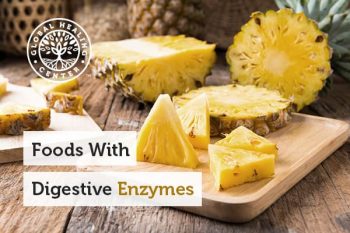Guest writer for Wake Up World
Digestion is a complex process with many components and digestive enzymes are among the most important.[1] Digestive enzymes help break down food so that the body can use the nutrients within the food. For a healthy person, their body should produce all the digestive enzymes they need. However, age, lifestyle, diet, and certain medical disorders can affect enzyme production. If this happens to you and your digestion isn’t as smooth as it could be, you can boost your enzyme supply by eating certain foods. In this article, we’ll look at some of the best food sources of digestive enzymes.
How Do Enzymes Help Digestion?
The process of digestion begins in the mouth and ends when waste exits the body. Digestive enzymes help break food into smaller and smaller pieces so your body can absorb and use the nutrients.
Other than salivary amylase, which is in the mouth, most digestive enzymes are activated in the acidic environment of the stomach, though some also work in the small and large intestines. Your gut health is directly connected to your overall health and wellness. This means that supporting your digestive health by eating enzyme-rich foods is a win/win.
If you lack energy or struggle with digestive ailments like bloating, constipation, diarrhea, heartburn, cramps after eating, or gastroesophageal reflux disorder (GERD), you may not have enough digestive enzymes. People with lactose intolerance, celiac disease, irritable bowel syndrome (IBS) or other disorders that affect enzyme production may benefit from eating enzyme-rich foods.
The 10 Best Foods for Digestive Enzymes
There are many foods that can boost your supply of digestive enzymes, and raw vegetables and fruits are among the best. Eating them raw is key since cooking food above 118 degrees Fahrenheit will deactivate the enzymes. Here are the top 10 foods with the most enzymes to add to your diet:
1. Papaya
Papaya is one of the best and most researched enzyme-rich foods.[2] Papaya contains papain, chymopapain, glycyl endopeptidase, and glutamine cyclotransferase — all of which help digest protein. Papain can ease constipation, bloating, heartburn, and symptoms of IBS.[3]
2. Pineapple
The entire pineapple is loaded with enzymes, even the stem. Pineapple contains bromelain, a family of enzymes that includes peroxidase, acid phosphatase, cysteine proteinases, and proteolytic (protein-digesting) enzymes.[4] Bromelain breaks proteins into amino acids, and studies suggest it may help cardiovascular, respiratory, bone, and digestive health.[5]
3. Avocado
Avocados contain lipase, an enzyme that breaks down dietary fat. Although lipase is produced naturally in the body, studies suggest that eating avocados or taking a lipase supplement helps you digest high-fat meals. It may also help you feel less full and bloated.[6] Studies have found that lipase may reduce indigestion and flatulence. As a bonus, avocado supports the immune system, especially in people with celiac disease or gluten-intolerance.[7]
4. Kiwi
Kiwis contain actinidin, a cysteine protease enzyme that helps digest protein. Actinidin increases the rate at which the small intestine absorbs protein.[8] Research shows that while kiwifruit aids digestion, it also prevents bloating and the too-full feeling that accompanies it.
5. Bananas
Bananas contain amylase and glucosidase. These enzymes digest carbohydrates like potatoes and pasta and break them into easily digestible simple sugars. Bananas also provide dietary fiber, which supports digestion and gut bacteria. In one study, people who ate two bananas per day experienced less bloating than those who didn’t.[9] Because of its tendency to promote normal blood sugar levels, scientists have evaluated the role of glucosidase in diabetes management, as well as its antioxidant properties.[10]
6. Raw Honey
Raw honey contains a wide array of digestive enzymes, including diastase, amylase, invertase, and protease. Diastase helps digest starch, amylase breaks starch into sugars, invertase breaks down sucrose, and protease breaks protein down into amino acids.[11]
7. Kefir
Kefir, a yogurt-like drink, can provide lipase, protease, and lactase enzymes. Kefir is best when it’s made from goat’s milk or coconut milk. Kefir may aid in lactose intolerance and contains healthy probiotics that improve overall gut health and may reduce flatulence.[12] If you’re interested in making your own kefir, check out our organic coconut milk kefir recipe.
8. Sauerkraut
Sauerkraut — raw, shredded, fermented cabbage — is one of the healthiest enzyme-rich fermented foods. It contains a variety of enzymes and the lactic acid bacteria Lactobacillus plantarum.[13] These probiotic bacteria can alleviate many digestive complaints. Keep in mind that cooking sauerkraut will reduce its enzyme activity.
9. Mango
Sweet and delicious, mangoes contain amylase enzymes that help break complex carbohydrates down into glucose and maltose. One study found that the enzymes in mangoes improved starch and protein digestion.[14] The enzymes become more active the riper the fruit gets, so look for sweet, ripe mangoes rather than eating them green.
10. Ginger
Ginger contains the protein-digesting enzyme zingibain, which may give this tuber root its nausea-fighting properties. Ginger also helps the stomach contract, moving food through the digestive system more rapidly.[15]
Should You Take a Digestive Enzyme Supplement?
Adding enzyme-rich raw fruits, vegetables, and fermented foods to your diet can help gut health, boost energy, and improve your overall wellness. However, if you don’t eat enough raw fruits and vegetables, you might consider taking a digestive enzyme supplement.
Studies suggest that full-spectrum supplements might help improve poor nutrient absorption.[16] When selecting a specific digestive enzyme, it helps to have an idea of which foods are causing distress.
I recommend VeganZyme, a comprehensive, broad-spectrum blend of digestive and systemic enzymes designed to aid digestive health by allowing your body to work as a whole. Free of fillers, toxic additives, and animal products, VeganZyme is one of the best and most complete enzyme formulas available.
Points to Remember
The body produces digestive enzymes, but age and health ailments can interfere. Eating raw fruits and vegetables like mangoes and bananas, as well as fermented foods such as sauerkraut and kimchi, can provide extra enzymes to support digestion and gut health. Heating food over 118 degrees Fahrenheit inactivates food enzymes, so consuming raw foods is key.
Among the best foods for enzymes are pineapples and papayas, which contain bromelain and papain, respectively. If you do not eat enough raw fruits and vegetables, you can reach for either a broad-spectrum enzyme supplement or one that specifically supports the digestion of the food you have trouble with.
Do you take a digestive enzyme supplement? What was your motivation? What benefits have you noticed? Leave a comment below and share your experience with us!
References:
- Clemente J, et al. The impact of the gut microbiota on human health: an integrative view. Cell. 2012; 148(6):1258-1270.
- Amri E, Mamboya F. Papain a plant enzyme of biological importance: a review. Am J Biochem Biotechnol. 2012;8(2):99-104.
- Muss C, et al. Papaya preparation (caricol) in digestive disorders. Neuroendocrinol Lett. 2013;34(1):38-46.
- Rowan AD, et al. The cysteine proteinases of the pineapple plant. Biochemical Journal. 1990;266(3):869–875.
- Raejendra P, et al. Properties and therapeutic application of bromelain: a review. Biotechnol Res Institute. 2012;976203.
- Levine ME, et al. Lipase supplementation before a high-fat meal reduces perceptions of fullness in healthy subjects. Gut and Liver. 2015;9(4):464-469.
- Branislav R, et al. Adipose triglyceride lipase in immune response, inflammation, and atherosclerosis. Biol Chem. 2012;393(9):1005-1011.
- Lovedeep K, et al. Influence of kiwifruit on protein digestion. Adv Food Nutr. 2013;68:149-167.
- Mitsou EK, et al. Effect of banana consumption faecal microbiota: a randomized controlled trial. Anaerobe. 2011;17(6):384-387.
- Adedayo B, et al. Antioxidant and antihyperglycemic properties of three banana cultivars. Scientifica (Cairo). 2016;8391398.
- Babacan S, et al. Characterization of honey amylase. J Food Sci. 2007;72(1):C050-5.
- Hertzler SR, et al. Kefir improves lactose digestion and tolerance in adults with lactose maldigestion. J Am Diet Assoc. 2003;103(5):582-587.
- Swain MR, et al. Fermented fruits and vegetables of Asia: a potential source of probiotics. Biotechnol Res Institute. 2014;250424(10).
- Pluschke AM, et al. Dietary pectin and mango pulp effects on small intestinal enzyme activity levels and macronutrient digestion in grower pigs. Food Function. 2018:9(2):991-999.
- Wu KL, et al. Effects of ginger on gastric emptying and motility in healthy humans. Eur J Gastroenterol Hepatol. 2008 May;20(5):436-40.
- Gianluca I, et al. Digestive supplementation in gastrointestinal diseases. Curr Drug Metab. 2016;17(2):187-193.
Recommended articles by Dr. Edward Group:
- Study Finds Antidepressants to be Depressingly Ineffective
- The 9 Best Fermented Foods for Your Gut
- 14 Foods that Cleanse the Liver
- Top 5 Foods for the Pineal Gland
- The Importance of a Kidney Cleansing Diet
- The 9 Best Herbs for Lung Cleansing and Respiratory Support
- 7 Best Foods to Support Kidney Function
- How Fluoride Damages Pineal Gland Health
- 10 Uses for Organic Oregano Oil
- Lung Cleanse: 10 Ways to Detox Your Lungs
- 10 Aloe Vera Uses You Probably Didn’t Know About
About the author:
Dr. Edward F. Group III (DC, ND, DACBN, DCBCN, DABFM) founded Global Healing Center in 1998 with the goal of providing the highest quality natural health information and products. He is world-renowned for his research on the root cause of disease. Under his leadership, Global Healing Center earned recognition as one of the largest natural and organic health resources in the world. Dr. Group is a veteran of the United States Army and has attended both Harvard and MIT business schools. He is a best-selling author and a frequent guest on radio and television programs, documentary films, and in major publications.
Dr. Group centers his philosophy around the understanding that the root cause of disease stems from the accumulation of toxins in the body and is exacerbated by daily exposure to a toxic living environment. He believes it is his personal mission to teach and promote philosophies that produce good health, a clean environment, and positive thinking. This, he believes, can restore happiness and love to the world.
For more, please visit Global Healing Center.

If you've ever found value in our articles, we'd greatly appreciate your support by purchasing Mindful Meditation Techniques for Kids - A Practical Guide for Adults to Empower Kids with the Gift of Inner Peace and Resilience for Life.
In the spirit of mindfulness, we encourage you to choose the paperback version. Delve into its pages away from screen glare and notifications, allowing yourself to fully immerse in the transformative practices within. The physical book enriches the learning process and serves as a tangible commitment to mindfulness, easily shared among family and friends.
Over the past few years, Wake Up World has faced significant online censorship, impacting our financial ability to stay online. Instead of soliciting donations, we're exploring win-win solutions with our readers to remain financially viable. Moving into book publishing, we hope to secure ongoing funds to continue our mission. With over 8,500 articles published in the past 13 years, we are committed to keeping our content free and accessible to everyone, without resorting to a paywall.









